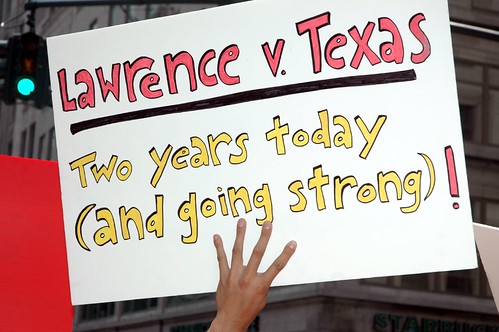worth remembering - Ten Years Ago Today
SCOTUS issued Lawrence v Texas, 539 U.S. 558. In the 6-3 ruling, the Court specifically struck down the anti-sodomy statute in Texas, reversed itself from Hardwicke v Bowersin 1986 which had upheld Georgia's anti-sodomy law, finding that case viewed the liberty interest too narrowly. The Court held that intimate consensual sexual conduct was part of the liberty protected by substantive due process under the Fourteenth Amendment.
Five Justices ruled on the basis of due process - Anthony Kennedy, who wrote the opinion of the Court, David Souter, John Paul Stevens, Stephen Breyer, and Ruth Bader Ginsburg. Sandra Day O'Connor vote on the basis of equal protection, because the Texas statute made a distinction between opposite sex and same sex couples doing the same acts.
Today the Court will issue decisions on DOMA and on Prop 8.
Will Kennedy remain true to his previous pattern of recognizing the rights of gays? In his opinion in Lawrence, Kennedy specifically noted that overturning the Texas law "does not involve whether the government must give formal recognition to any relationship that homosexual persons seek to enter."
It is worth noting several aspects of two dissents.
Scalia opined that if there was no basis to ban behavior based on moral choices, then - among other things -
Five Justices ruled on the basis of due process - Anthony Kennedy, who wrote the opinion of the Court, David Souter, John Paul Stevens, Stephen Breyer, and Ruth Bader Ginsburg. Sandra Day O'Connor vote on the basis of equal protection, because the Texas statute made a distinction between opposite sex and same sex couples doing the same acts.
Today the Court will issue decisions on DOMA and on Prop 8.
Will Kennedy remain true to his previous pattern of recognizing the rights of gays? In his opinion in Lawrence, Kennedy specifically noted that overturning the Texas law "does not involve whether the government must give formal recognition to any relationship that homosexual persons seek to enter."
It is worth noting several aspects of two dissents.
Scalia opined that if there was no basis to ban behavior based on moral choices, then - among other things -

